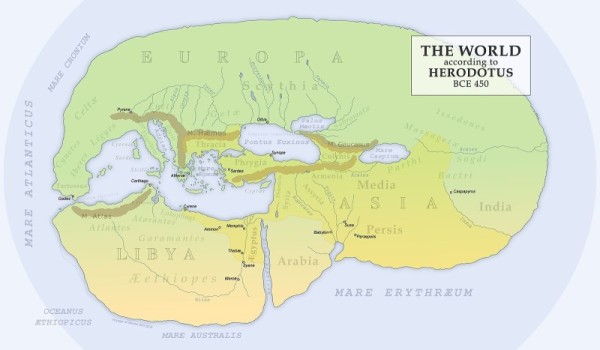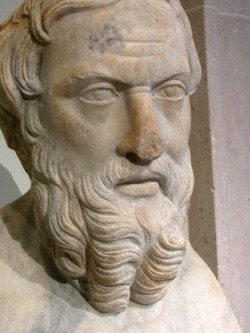. . . but in fact the army was being sent out (as I believe) for the purpose of subduing Libya: for of the Libyans there are many nations of nations of various kinds, and but few of them are subject to the king, while the greater number paid no regard to Darius.

Translated by George C. Macaulay — our special project presenting the complete Herodotus with URLs for all of those people, places, events, and things which baffles and discourages modern readers.
Previously on Herodotus
164. Thus the Pythian prophetess gave answer to Arkesilaos; and he, having taken to him those in Samos, made his return to Kyrene; and when he had got possession of the power, he did not remember the saying of the Oracle but endeavored to exact penalties from those of the opposite faction for having driven him out. Of these some escaped out of the country altogether, but some Arkesilaos got into his power and sent them away to Cyprus to be put to death. These were driven out of their course to Cnidos, and the men of Cnidos rescued them and sent them away to Thera. Some others however of the Kyrenians fled to a great tower belonging to Aglomachos a private citizen, and Arkesilaos burnt them by piling up brushwood round. Then after he had done the deed he perceived that the Oracle meant this, in that the Pythian prophetess forbade him, if he found the jars in the furnace, to heat them fiercely; and he voluntarily kept away from the city of the Kyrenians, fearing the death which had been prophesied by the Oracle and supposing that Kyrene was flowed round by water. Now he had to wife a kinswoman of his own, the daughter of the king of Barca whose name was Alazeir: to him he came, and men of Barca together with certain of the exiles from Kyrene, perceiving him going about in the market-place, killed him, and also besides him his father-in-law Alazeir. Arkesilaos accordingly, having missed the meaning of the oracle, whether with his will or against his will, fulfilled his own destiny.
165. His mother Pheretime meanwhile, so long as Arkesilaos having worked evil for himself dwelt at Barca, herself held the royal power of her son at Kyrene, both exercising his other rights and also sitting in council: but when she heard that her son had been slain in Barca, she departed and fled to Egypt: for she had on her side services done for Cambyses the son of Cyrus by Arkesilaos, since this was the Arkesilaos who had given over Kyrene to Cambyses and had laid a tribute upon himself. Pheretime then having come to Egypt sat down as a suppliant of Aryandes, bidding him help her, and alleging as a reason that it was on account of his inclination to the side of the Medes that her son had been slain.
166. Now this Aryandes had been appointed ruler of the province of Egypt by Cambyses; and after the time of these events he lost his life because he would measure himself with Darius. For having heard and seen that Darius desired to leave behind him as a memorial of himself a thing which had not been made by any other king, he imitated him, until at last he received his reward: for whereas Darius refined gold and made it as pure as possible, and of this caused coins to be struck, Aryandes, being ruler of Egypt, did the same thing with silver; and even now the purest silver is that which is called Aryandic. Darius then having learnt that he was doing this put him to death, bringing against him another charge of attempting rebellion.
167. Now at the time of which I speak this Aryandes had compassion on Pheretime and gave her all the troops that were in Egypt, both the land and the sea forces, appointing Amasis a Maraphian to command the land-army and Badres, of the race of the Pasargadai, to command the fleet: but before he sent away the army, Aryandes despatched a herald to Barca and asked who it was who had killed Arkesilaos; and the men of Barca all took it upon themselves, for they said they suffered formerly many great evils at his hands. Having heard this, Aryandes at last sent away the army together with Pheretime. This charge then was the pretext alleged; but in fact the army was being sent out (as I believe) for the purpose of subduing Libya: for of the Libyans there are many nations of nations of various kinds, and but few of them are subject to the king, while the greater number paid no regard to Darius.

CC BY-SA 2.0 image from Wikipedia.
168. Now the Libyans have their dwelling as follows: Beginning from Egypt, first of the Libyans are settled the Adyrmachidai, who practice for the most part the same customs as the Egyptians, but wear clothing similar to that of the other Libyans. Their women wear a bronze ring upon each leg, and they have long hair on their heads, and when they catch their lice, each one bites her own in retaliation and then throws them away. These are the only people of the Lybians who do this; and they alone display to the king their maidens when they are about to be married, and whosoever of them proves to be pleasing to the king is deflowered by him. These Adyrmachidai extend along the coast from Egypt as far as the port which is called Plynos.
169. Next after these come the Giligamai, occupying the country towards the West as far as the island of Aphrodisias. In the space within this limit lies off the coast the island of Platea, where the Kyrenians made their settlement; and on the coast of the mainland there is Port Menelaos, and Aziris, where the Kyrenians used to dwell. From this point begins the silphion and it extends along the coast from the island of Platea as far as the entrance of the Syrtis. This nation pracctices customs nearly resembling those of the rest.
170. Next to the Giligamai on the West are the Asbystai: these dwell above Kyrene, and the Asbystai do not reach down the sea, for the region along the sea is occupied by Kyrenians. These most of all the Libyans are drivers of four-horse chariots, and in the greater number of their customs they endeavour to imitate the Kyrenians.
171. Next after the Asbystai on the West come the Auchisai: these dwell above Barca and reach down to the sea by Euesperides: and in the middle of the country of the Auchisai dwell the Bacales, a small tribe, who reach down to the sea by the city of Taucheira in the territory of Barca: these pracctice the same customs as those above Kyrene.
– Herodotus, Book IV
| <—Previous | Master List | Next—> |
Herodotus made his living by being interesting. In a world where most people did not read and could not afford to buy a book even if they could, they would pay to listen to Herodotus recite from his books. They would not pay to be bored. In that world, the names that populate his stories would have some general familiarity to his audience. Their obscurity to us is a barrier that this series seeks to break down.
MORE INFORMATION
MAP LIBRARY
Because of lack of detail in maps as embedded images, we are providing links instead, enabling readers to view them full screen.

Leave a Reply
You must be logged in to post a comment.